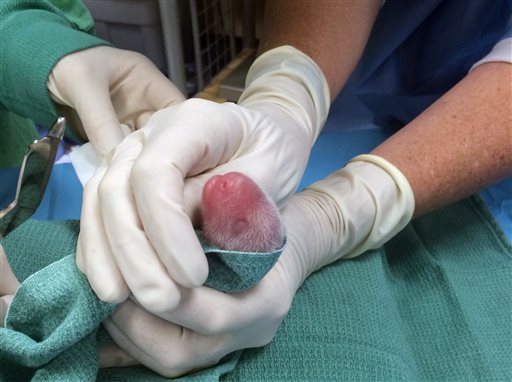
In this photo provided by the Smithsonian’s National Zoo, one of the giant panda cubs is examined by veterinarians after being born at Smithsonian’s National Zoo on Saturday, Aug. 22, 2015, in Washington. The National Zoo in Washington says its adult female panda has had twins. BECKY MALINSKY/SMITHSONIAN’S NATIONAL ZOO VIA AP
WASHINGTON–Twin cubs born to a rare giant panda called Mei Xiang were doing well Sunday, vocal and “very, very active” after the surprise back-to-back births at the Smithsonian National Zoo, her handlers said.
The cubs were successfully swapped out early Sunday after being closely monitored through the night by experts concerned about their mother’s ability to care for both offspring at the same time.
“We’ve all been involved in events that don’t go well. So we’re ecstatic that things are going great,” said the zoo’s chief veterinarian Don Neiffer.
He said the cubs had shown “very strong vocalization” and were “very, very active,” good signs for a species that is famously challenging to breed in captivity.
A first tiny cub–pink, hairless and only about the size of an adult mouse–was born at 5:35 p.m. (2135 GMT) Saturday and Mei Xiang reacted by tenderly picking it up.
Just when conservationists thought they had heard all the good news, the zoo tweeted: “We can confirm a second cub was born at 10:07. It appears healthy. #PandaStory.”
‘Out popped a cub’
Laurie Thompson, a giant panda biologist at zoo, said she became aware a second cub was on the way when she heard Mei Xiang grunt on her office panda cam.
“I looked over at the camera and out popped a cub,” she said.
“So we immediately jumped into, ‘Okay, what do we do now.’ We watched to see how Mei Xiang would handle two.
“We gave her a little bit of time to actually see if she would pick both cubs up, but she was really struggling.
“She was trying, but she wasn’t able to pick up both of the cubs. So we did go in and at the right moment we were able to go in and pick up one of the cubs when Mei Xiang was not really close to it.”
The cubs were switched out again at 6:30 a.m. on Sunday, zoo officials said.
While panda twins are not uncommon in the wild, they need intensive maternal care after birth, making survival precarious.
Mei Xiang’s cubs are the third set of twins born in captivity in the United States. Only a set born in 2013 at the Atlanta zoo has survived.
Experts feel the best way to keep both cubs alive is to keep swapping them, so they each get quality time with their mother.
“There is not really a definite time when we’re out of the woods. This really a critical period,” said Neiffer. “We need to make sure these cubs get jump-started and get on a positive growth curve.”
“And honestly, until the cubs are both out walking around, acting normal, being a panda, that is probably when we’ll exhale. So we’ve got a long time.”
So far, the zoo’s experts have opted not to feed the cubs a dietary supplement, but are prepared to do so if either of them begin to lose weight.
Still to be determined are the cubs’ sex.
“I can tell you we’ve looked closely and we’re not sure,” said Neiffer. “We’re thinking probably three to four weeks before were willing to say whether they are a boy or girl.”
Paternity tests
Mei Xiang (“beautiful fragrance”), 17, was artificially inseminated in April with frozen semen from a male giant panda named Hui Hui that resides at the China Conservation and Research Center for the Giant Panda in Sichuan province.
She was also inseminated with fresh semen from the zoo’s male giant panda Tian Tian. DNA tests will establish which is the father.
Mei Xiang had a cub in 2005 which was sent to China, and another, Bao Bao, is now two years old and lives with her in Washington.
But she also lost at least two other cubs, one that was stillborn in 2013 and another that lived just six days in 2012.
“Mei Xiang throws us for a loop every time. She never does anything twice,” said Thompson.
This year, Mei Xiang exhibited signs of pregnancy in July that included sleeping more, eating less, building a nest and spending more time in her den.
The zoo said Mei Xiang will spend almost all her time in her den for the next two weeks. The enclosure will be closed to ensure peace and quiet, though online “panda cams” provide a video stream of the creatures.
On Tuesday, Malaysia announced that a giant panda at its National Zoo, Liang Liang, had given birth. The newborn’s sex has also yet to be determined.
There are fewer than 2,000 pandas left in the wild, according to the World Wildlife Fund, as their habitats have been ravaged by development.–Jim Mannion